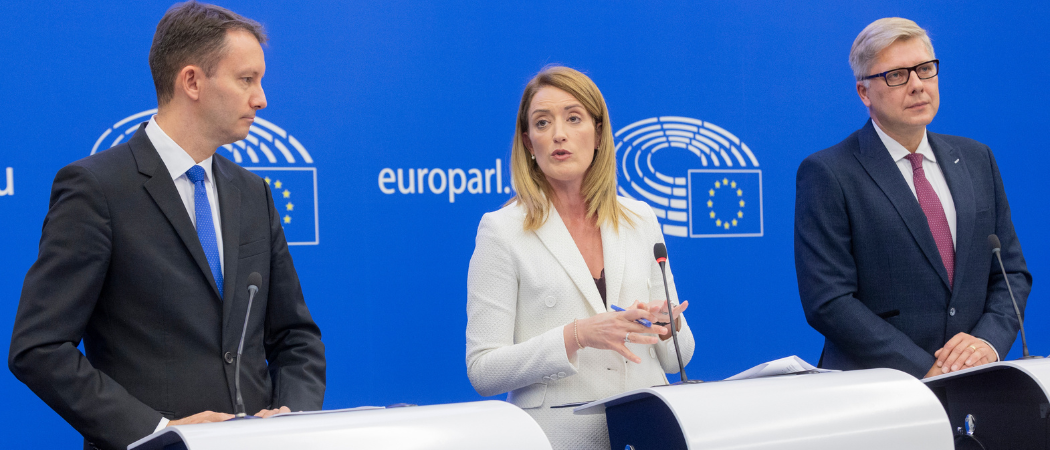In the annual budget showdown, member states want to save money. Parliament vows not to let €166M be subtracted from EU research spending and is instead bidding for an extra €140M. Negotiations promise to be tougher than usual

Press conference on the outcome of the vote on Parliament's position on the 2024 EU budget. From left to right: MEP Siegfried Mureşan, European Parliament President Roberta Metsola, MEP Nils Ušakovs. Photo: Alain Rolland / European Union
The European Parliament is ready for tough negotiations with EU member states over the EU’s budget for 2024, including a proposed €12.8 billion for the Horizon Europe research programme.
But member states want to see Horizon Europe cut by €166 million to ensure that the budget is fully spent. They justify this because every year around 5% of the money committed to research in framework programmes does not make it to scientists. That is usually because projects are slower to get off the ground than expected or do not run as quickly as forecast. If money is not disbursed, it doesn’t automatically return to the budget.
The European Parliament, which voted through its opinion on Wednesday, wants to reverse the proposed €166 million cut and boost funding by an extra €140 million in order to put more money into basic, health and climate research in Horizon Europe next year.
Parliament and member states have to agree a final figure by 13 November, in time to approve the budget for next year.
Speaking at the final Parliament plenary debate, the rapporteur for the file Siegfried Mureşan named research and innovation first in the list of priorities. “We have to invest more in Horizon Europe, in research and innovation,” he told fellow MEPs. “Here, we have concrete benefits for the people of Europe, including medical research. We have concrete benefits for our enterprises, to make sure that they remain innovative, strong, competitive.”
MEP Christian Ehler, Parliament’s loudest voice on research, had harsh words for the member states, calling the proposed cut “mad” and suggesting “the Council lost their mind.”
“The Council cut €20 million from the European Research Council that is producing Nobel Prize winners – and you show yourself in public,” said Ehler. “Get to terms, we want our budget back,” he told the member states.
The EU budget commissioner Johannes Hahn welcomed the Parliament’s move to reverse the cuts which he said, “are not accompanied by adequate justifications” and in addition “do not respect the Council’s own priorities.”
The Parliament also has the support of the research community, which has signalled the cuts risk undermining the EU’s ambitious green and digital goals.
Rising costs
These negotiations are an annual ritual: the member states want to cut the budget and Parliament proposes to boost it. But this year it may be an even tougher battle, because member states are growing increasingly worried about the rising costs of paying back EU pandemic recovery loans, inflation, and the various emergencies that the bloc faces, from Russia’s war in Ukraine to the escalating conflict in the Middle East.
“The Council has tried to stick to its budget to ensure the European Union acts in a responsible manner and is able to face up to any unpredicted emergencies that may arise,” Esperanza Samblás told the MEPs on behalf of the EU Council’s Spanish presidency.
And there’s an extra layer of technical complexity: the European Parliament chose to tie in next year’s budget with the proposed review of the seven-year EU budget, which the member states want to negotiate separately.
The mid-term review, presented in June, asks the member states to put more money into the EU budget for priorities such as support for Ukraine and funding to boost the bloc’s technology sovereignty.
But it’s unclear whether the member states will commit to the mid-term review proposal. The issue is set to be discussed at the highest level by EU heads of state at the European Council meeting next week.
This may pose a big stumbling block, as MEPs’ call for more money goes beyond the available funds, assuming member states will agree to give the EU fresh money.
Commissioner Hahn gave a restrained nod of approval to the Parliament’s proposed budget top-ups, noting the negotiators will have to wait for the heads of state to provide ‘clear guidance’ before the talks can happen.
Speaking of the revision, Samblás once again warned MEPs the EU must act within its means. “The Council cannot accept the increase from the European Parliament based on an increased [EU budget],” she said.
This year’s negotiations promise to be taxing, but if history is anything to go by, the final figure is likely to stay close to the Commission’s original proposal. Last year, member states wanted to slash the EU research budget by €663 million, while the Parliament demanded a €311 million top-up. The final result was a meagre €10 million increase in the €12.3 billion budget.
The 21 day negotiation period starts next week, on 24 October. The Parliament and the Council of member states will have 21 days to reach a deal to have an EU budget ready for next year.





 A unique international forum for public research organisations and companies to connect their external engagement with strategic interests around their R&D system.
A unique international forum for public research organisations and companies to connect their external engagement with strategic interests around their R&D system.